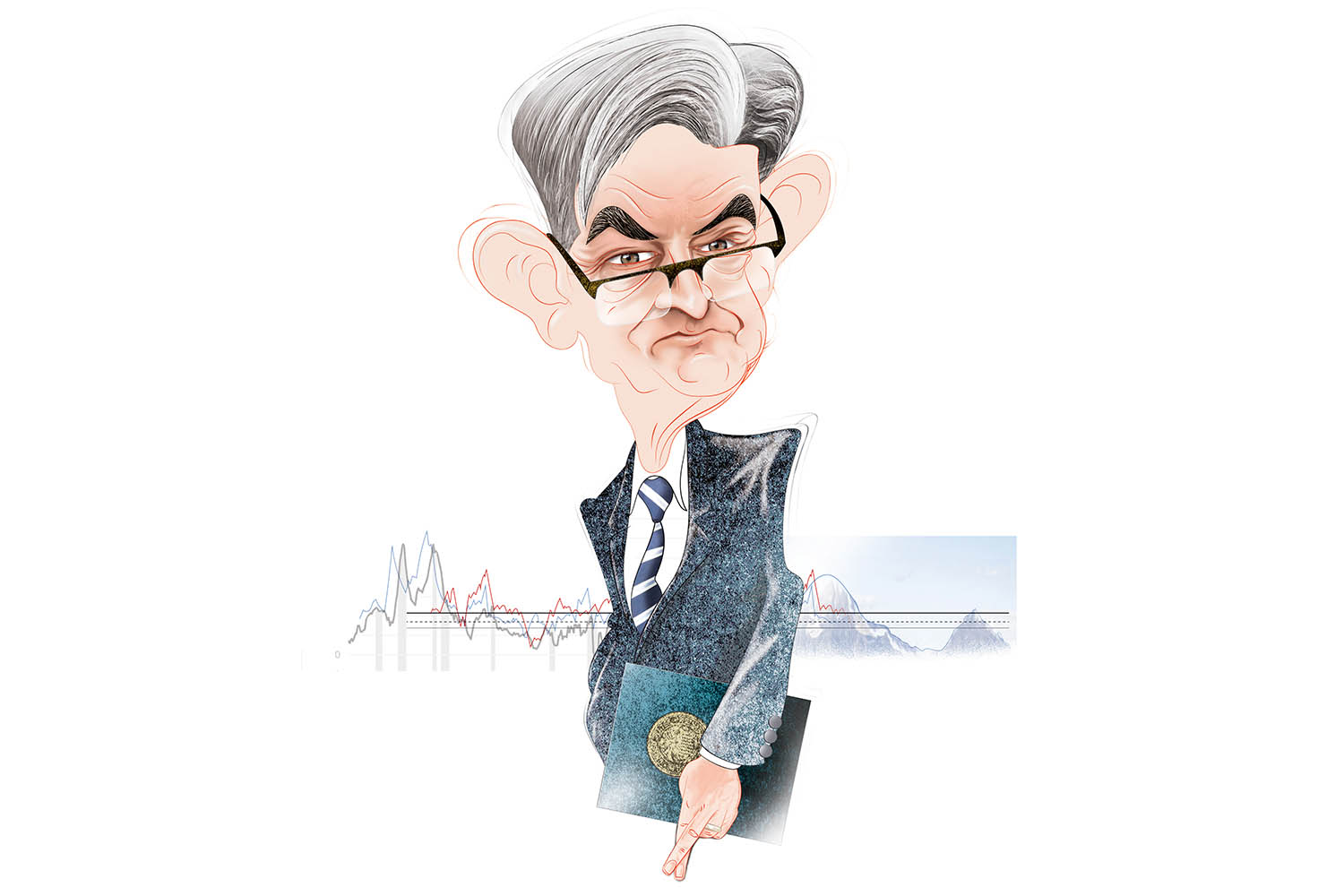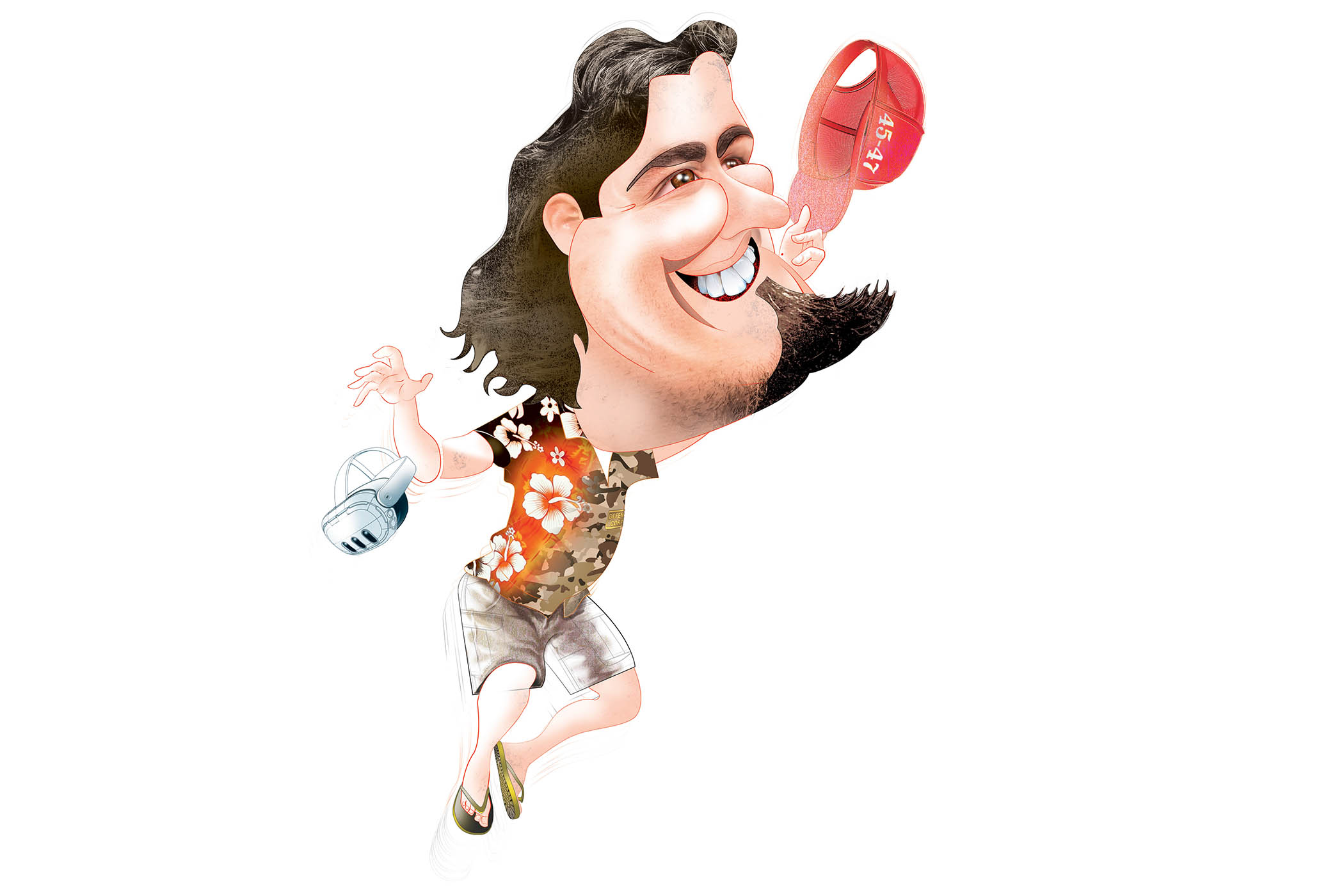Illustration by Andy Bunday
Jackson Hole, with its stunning views of the Grand Teton mountains, is one of America’s most beautiful escapes. For the past few days, it has been home to Jerome “Jay” Powell and the best friends an embattled Federal Reserve chairman can have – his fellow central bankers. Andrew Bailey, governor of the Bank of England, was there, as was Christine Lagarde, president of the European Central Bank, not least to reassure Powell that the central bankers union has his back as he battles to save the independence of the Fed from an increasingly aggressive president.
Enjoying Wyoming’s fresh air and outdoor pursuits, such as white-water rafting, while debating weighty economic topics with fellow central bankers sure beats donning a hard hat to give an angry Donald Trump a tour of refurbishment work in the Fed building, as Powell did the other week on live TV. Alleging cost overruns of billion of dollars, Trump was fishing for a reason to fire him “for cause”, the only grounds a president can use to dismiss a Fed chair, the 1935 Banking Act having legally protected the independence of the Federal Reserve system from White House interference.
The 72-year-old Fed chair stole the show and lived to fight another day with a carefully curated fact-check of Trump’s wildly wrong numbers.
Since regaining the presidency, Trump, who chose Powell to be Fed chair early in his first term as president, only to turn on him soon after, has maintained a steady flow of abusive social media posts blaming him for failing to cut interest rates fast enough and suggesting that his beloved tariffs might be inflationary. “He is TOO LATE, and actually, TOO ANGRY, TOO STUPID, & TOO POLITICAL, to have the job of Fed chair,” blasted one typical recent example. Trump has also called him a “fool” and a “numbskull”. At one point, Trump reportedly drafted a letter firing Powell and showed it to a few Republican senators, only to deny having done so, or to have any such intention, when the financial markets got wind of it and panicked.
If the president’s goal is to bully him into a resignation, he has met his match in Powell, who seems determined to do his job to the best of his ability until his term ends next May. An Ivy League graduate who has deliberately and easily moved between the private sector and public service throughout a distinguished career, Powell is one of those strong on rectitude, “public service is a privilege” establishment Republicans who were once the best face of the Grand Old Party, but under Trump are almost extinct.
In his 20s, he found inspiration in a fellow Princeton alumnus, George Schultz, who as secretary of state resolutely opposed his boss, Ronald Reagan, over his support for the Contras in El Salvador. Nicholas Brady, another cut from the same cloth, gave Powell his first government job, as an assistant secretary in the Treasury.
As an undergraduate, Powell considered economics “boring” but, given the path of his career, seems to have altered his views. A Grateful Dead fan now for more than 50 years, at college he preferred playing his acoustic guitar (which he still strums today) with student friends. In Washington DC, his affable straight-talking has been welcomed by many for returning the Fed to a time when technical economists were less dominant – as renowned former chair William McChesney Martin put it: “on tap… but never on top”.
Powell’s immediate predecessors “spoke economics first and English second”, says David Wessel of the Brookings Institution. “Ben Bernanke was an introvert and Janet Yellen was friendly but not really a good reader of politics. Powell quickly formed good relationships on Capitol Hill.”
Whether economists ultimately count Powell among the most successful Fed chairs is likely to depend on what he can do to rectify his one clear mistake. The Fed has a “dual mandate” of delivering full employment and stable prices (usually seen as keeping inflation to an annual rate of 0-2%). When the Covid pandemic hit in 2020, Powell was quick and decisive in acting to protect jobs through some particularly creative forms of economic stimulus. But when prices rose sharply, he thought this was a short-lived “transitory inflation” brought on by the pandemic, and was slow to put up rates to tackle it. (Joe Biden’s dithering over whether to reappoint or replace Powell with someone more to Elizabeth Warren’s liking didn’t help, arguably delaying some key decisions.)
Newsletters
Choose the newsletters you want to receive
View more
For information about how The Observer protects your data, read our Privacy Policy
Once he saw that transitory didn’t mean quick, Powell rapidly raised rates and seemed to be bringing inflation under control until Trump’s tariffs called that progress into question. In his speech at Jackson Hole on Friday, he noted that “risks to inflation are tilted to the upside, and risks to employment to the downside – a challenging situation”, and hinted that a small interest rate cut may come in September. But that may depend on which of next month’s jobs and consumer-price data is the more alarming.
At college he liked to play his acoustic guitar, which he still strums today
At college he liked to play his acoustic guitar, which he still strums today
Despite that hint, Powell's inclination probably remains to err on the side of caution rather than rush to cut rates to cool the political heat on him.
There is overwhelming evidence that countries with independent central banks have better performing economies. America also has a long tradition of presidents criticising the Fed’s decisions while ultimately leaving its independence untouched.
Perhaps that will turn out to be true of Trump too. Maybe his attacks on Powell are simply setting him up to be the fall guy if the economy does plunge into recession and/or becomes mired in stagflation. With Trump, there is always a chance he’ll pick a wild card from Fox News – Maria “Money Honey” Bartiromo, say – but in the end he may find someone to run the Fed who is orthodox enough to satisfy the Senate and the financial markets.
Whoever it is will have to prove their independence quickly to earn the trust of the markets – by doing something that annoys the president. It is important to remember that the Fed’s independence is not totally reliant on the chair; he or she can be outvoted on interest rate decisions, for example, by the other members of the open market committee, who are all on long-term contracts with robust job protections. A desire to free up a spot for a loyalist may be behind Trump’s call last week for the resignation of one of them, Lisa Cook, a Biden appointee: she has been accused of fraud in a mortgage application.
Those other members could include Powell, who has the right to stay on the committee after his term as chairman ends. Friends say he has yet to make up his mind. The attacks from Trump have taken their toll; he is tired and ready to move on.
So we should savour while we still can, the work of that increasingly rare creature, a leader in American public service who can say with a straight face, as Powell did in May to the Princeton graduating class: “At the end of the day, your integrity is all you have. Guard it, carefully.”
Jerome ‘Jay’ Powell
Born 1953
Alma mater Princeton
Work Federal Reserve chair
Family Wife, Elissa, three children



